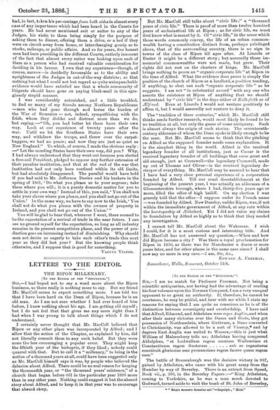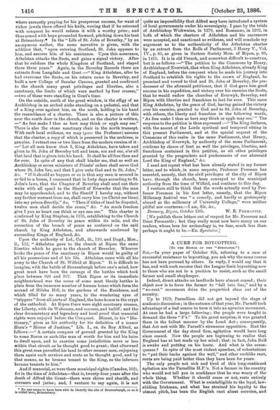[To THE EDITOR Or THE " SPECTATOR."1 SIR, — I am no
match for Professor Freeman. Not being a scientific antiquarian, nor having had the advantage of reading his four volumes upon the Norman Conquest, I am a very unequal opponent to so great an authority. lf, therefore, he cannot be courteous, he may be pitiful, and bear with me while I state my reasons for saying that I am quite as conscious as he is of the distinction between sovereignty and overlordship. I have said that Alfred, Edmund, and Athelstan were reges Anglice,and when after their many victories over the Danes and Scots, they got possession of Northumbria, where Guthrum, a Dane converted to Christianity, was allowed to be a sort of Viceroy,* and by degrees East Anglia was united to Wessex,—this is just what William of Malmesbury tells us ; Athelstan having conquered Aldulphus, " et Ludwallnm regem omnium Wallensium at
Constantinum regain Scotorum sub se regnatnros constituit gloriosius ease pronnncians regem facere quam regem ease."
The battle of Brunenburgh was. the decisive victory in 937, gained by Athelstan, who came with his great army from the Humber by way of Beverley. There is an extract from Speed, Book vii., p. 396, in the Beverley Papers :—" King Athelitan, coming to Yorkshire, as he was a man mach devoted to Godward, turned aside to visit the tomb of St. John of Beverley,
• " Begin manor° Sonatas eat."—Ingulph., " Hist."
where earnestly praying for his prosperous success, for want of richer jewels there offered his knife, vowing that if he returned with conquest he would redeem it with a worthy price ; and thus armed with hope proceeded forward, pitching down his tent at Brimenbury.* In the " Life of St. John of Beverley," by an anonymous author, the same narrative is given, with the addition that, "upon entering Scotland, St. John appears to him, and assures him of his assistance. Upon this assurance, Athelstan attacks the Scots, and gains a signal victory. After that he subdues the whole Kingdom of Scotland, and stayed there three years." Again, in the Beverley Records there are extracts from Langdale and Gent :—" King Athelstan, after he had overcome the Scots, on his return came to Beverley, and built a new College of Secular Canons, granted and confirmed to the church many great privileges and liberties, also a sanctuary, the limits of which were marked by four crosses," —two of these were standing in Gent's time.
On the outside, south of the great window, is the effigy of an Archbishop in an arched niche standing on a pedestal, and that of a King over against him, on the north, holding in his hand the resemblance of a charter. There is also a picture of this near the south door in the church, and on the charter is written, — " As free make I thee as hert may think or eygh may see." There is also the stone sanctuary chair in the north transept. With such local evidence, we may (pace the Professor) assume that the charter, a copy of which is preserved in the archives, is genuine. I extract one or two lines from the modern version of it :
— " Let all men know thut I, King Athelstan, have taken and given to St. John of Beverley toll and team; soc and sac, o'er all that land that is given into his hand. It shall be all free then and for ever. In spite of any that shall hinder me, that as well an Archbishop or seven ministers of Priests' orders shall serve God where St. John lies, and that I give unto God and to St. John," &c. " If it should so happen or so is that any man is secured in or fled to a house, I command that in forty days according to St. John's laws, that the Chapter of Beverley shall send out their writs with all speed to the Sheriff of Everwike that the man may be apprehended, and to the Sheriff I hereby say, without any farther warrant from me, shall carry him (so Christ me bless) into my prison directly," &c. " Then if titles of land be disputed, twelve men shall decide the cause," &c. "As much freedom give I you as heart can think or eye can see." This charter is confirmed by King Stephen, in 1135, establishing to the Church of St. John of Beverley its peace within its mile, and the correction of the breach of peace as conferred on the said church by King Athelstan, and afterwards confirmed by succeeding Kings of England, &c.
Upon the authority of Lel., Coll., iii., 110, and Dugd., Mon., ii., 132, "Athelstan gave to the church at Ripon the same liberties which he gave to the church of Beverley. Whoever broke the peace of the sanctuary in Ripon would be guilty of all his possessions and of his life. Athelstan came with all his army to the Church of St. Wilfrid at Ripon." It is difficult to imagine, with the battle of Brnnenburgh before one's mind, how great must have been the carnage of the battles which took place between 926 and 937. That Ripon or its immediate neighbourhood was the scene of some most bloody battles is plain from the immense number of human bones which form the mound of Hilsha Hill, in the gardens of the Residence, and which filled for so many years, to the wondering eyes of "trippers " from all parts of England, the bone house in the crypt of the cathedral. At Ripon there were eight sanctuary crosses, the Liberty, with its Wakeman, and coroner, and bailiff ; and the clear documentary and legendary and local proof that manorial rights were enjoyed before the Conquest. Blount, in his " Dic- . tionary," gives as his authority for his definition of a manor Horn's " Mirror of Justices," Lib. I., ca. da Roy Alfred, as follows :—" A certain compass of ground granted by the King to some Baron or such-like man of worth for him and his heirs to dwell upon, and to exercise some jurisdiction more or less within that circuit as he thought good to grant; that afterward this great man parcelled his land to other meaner men, enjoyning them again such services and rents as he thought good, and by that means, as he became tenant to the King, so the inferiors became tenants to him."
And if manorial, so were there municipal rights (Camden, 102), for in the time of Athelstan—that is, twenty-four years after the death of Alfred the Great—there were shires and sheriffs, and coroners and juries ; and, I venture to say again, it is not • No one seems to have been able to identify the site of Branenbargh, or as it is called here, Brimenbnry. quite an impossibility that Alfred may have introduced a system of local governments under his sovereignty. I pass by the trials of Archbishop Wickwaine, in 1279, and Romanns, in 1292, in both of which the charters of Athelstan and his successors were accepted, and sanctioned as evidence, and will conclude my argument as to the authenticity of the Athelstan charter by an extract from the Rolls of Parliament, 3 Henry V., Vol. IV., p. 85, as given in Snrtees Society Mem. of Ripon, p. 80, in 1415. It is in old French, and somewhat difficult to construe, but is as follows :—" The petition to the Commons by Henry, Archbishop of E verwick, that when King Athelstan, already King of England, before the conquest when he made his journey into Scotland to establish his rights to the crown of England, he promised and vowed to God and St. John of Beverley, the pre- decessor of the aforesaid petitioner, that if God gave him good success in his expedition, and victory over his enemies the Scots, that he would endow the churches of Everwyk, Beverley, and Ripon with liberties and franchises to last for ever. This same King Athelstan, by the grace of God, having gained the victory over his enemies, granted to God and to St. John of Beverley, with others, the liberty and franchise in the following words, As free make I thee as hert may think or eygh may see." The response to the petition is thus expressed :—" The King declares, with the assent of the Lords spiritual and temporal sitting in this present Parliament, and at the special request of the Commons of this realm in the same Parliament, that Henry, Archbishop of Everwyk, by authority of the same Parliament; confirms by clause of Heat as well the privileges, liberties, and franchises contained in this petition, as all other privileges granted by the progenitors and predecessors of our aforesaid Lord the King of England," &c.
I need not repeat what has been already stated in my former letter, and to which, in some respects, Professor Freeman has assented, namely, that the civil privileges of the city of Ripon have, through the church, been conveyed to the municipal authority from the time of Wilfrid, and continue to this day.
I venture still to think that the words actually used by Pro- fessor Freeman in his first letter, namely, that the Ripon Millenary festival was " a comedy, and hardly so grotesquely absurd as the millenary of University College," were neither- pitiful nor courteous.—I am, Sir, &c.,
Deanery, Ripon, October 13th. W. R. FREMANTLE.
[We publish these letters out of respect for Mr. Freeman and. Dean Fremantle ; but they really must now have mercy on our readers, whose love for archaeology is, we fear, much less than. perhaps it ought to be.—En. Spectator.]



































 Previous page
Previous page